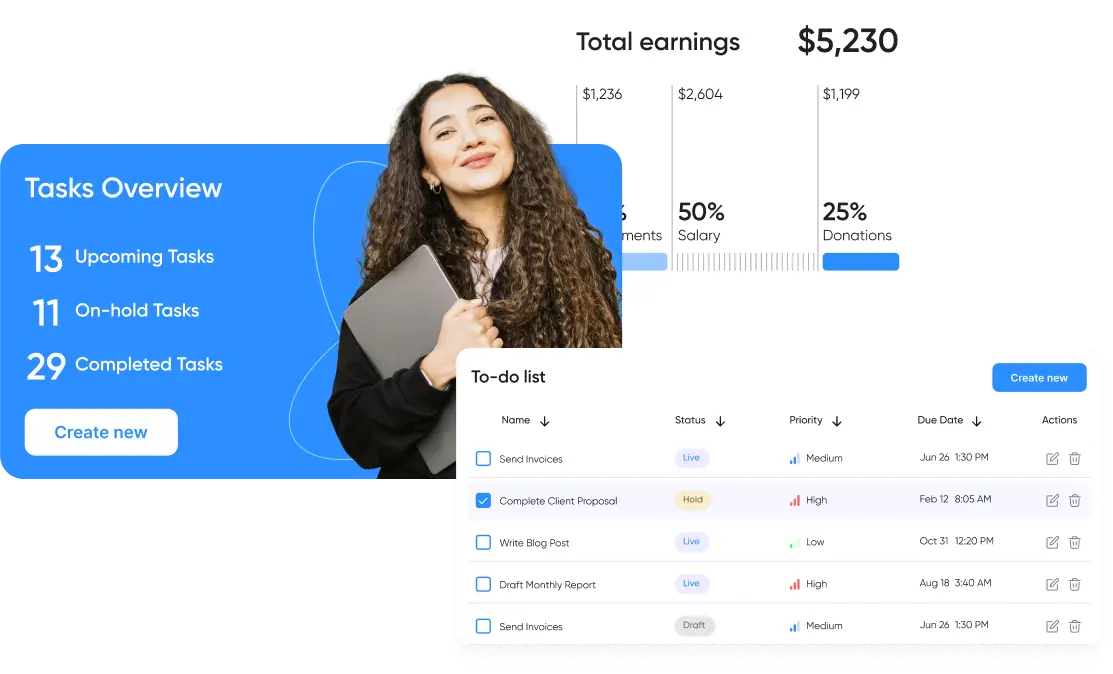ML
Machine Learning in Ecommerce: How to Boost Your Sales in 2023
ML and AI are here to change the world. These technologies are not just for big tech companies anymore—many businesses are starting to use machine learning and AI in their everyday operations, making them more efficient and effective than ever before.
By the end of 2023, artificial intelligence will handle a much larger share of e-retail processes. Businesses that use machine learning in ecommerce can solve customer issues almost instantly and make their buying process a much more pleasant experience. For this reason that by 2025, ML is expected to cover 95% of all online customer interactions. An 800% increase in AI retail investment is expected, as well as an inevitable rise in the importance of data analytics.
Machine learning is not only about trends. Practicing ML technologies helps you increase customer service, prevent churn, and ultimately, lead to higher profits.
Read further to learn how machine learning is transforming e-commerce and delivering higher levels of customer satisfaction with better sales.
Machine Learning in Ecommerce: Why Is It Crucial?
Machine learning is a technology that’s changing the way we do business. It helps us with everything from marketing and customer support to inventory management and product development.
Machine learning can be applied to any field, but in the context of e-commerce, it’s commonly used to analyze customer data to gain insights into customer behavior and create personalized experiences.
Machine learning in ecommerce also can be used for a range of operational tasks such as:
- Categorization of goods and their placement on the site;
- Combining duplicates and models into one card;
- Placement of goods in third-party marketplaces;
- Listing recommendations, and more.
Moreover, machine learning monitors customer sentiment, identifies improvement areas, automates marketing campaigns, and optimizes email open and click-through rates.
There are numerous benefits of using machine learning in ecommerce. They go beyond just improving your website’s performance.
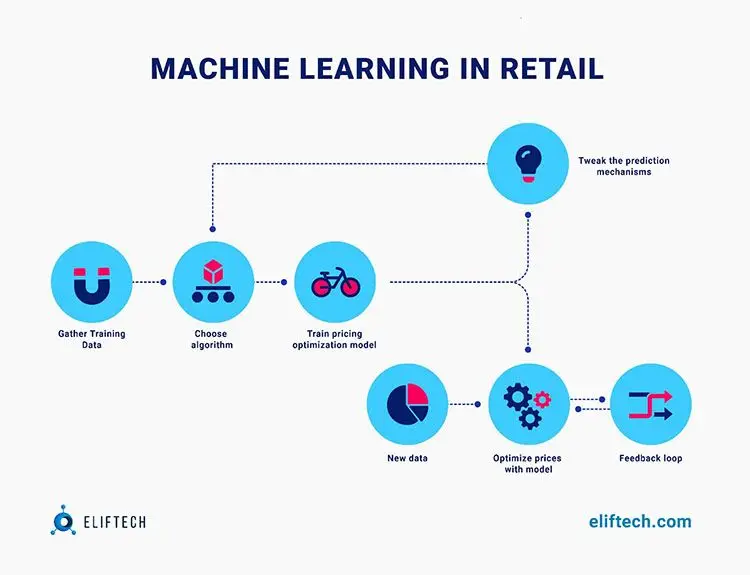
Let’s dive deep into the critical perks that machine learning can offer.
Higher Sales Conversion Rates
ML optimization allows any strategies to maintain relationships with digital sales, for example, a tech solution offering flexible and alternative payment. What happens when a user is in front of an item they want but cannot pay for now? They leave the operation for later at best. This scenario can be changed by taking the effective action of choosing flexible payment. With the right machine learning applications, you can offer customers an option to pay later or in installments.
Read more about the ElifTech case: E-Commerce Platform with Comparison Functionality
This system can influence the decision made by clients or users to the point that your opinion may differ entirely from what was accepted initially. And it will serve as a solution for converting visits into sales. However, it’s worth noting that this conversion factor is always more profitable in the medium and long term. With results that may surprise you from the first moment, their conclusions vary regarding the visibility of the business project and the elevation of products or services.
Read more about the ElifTech case: Shopify Application for Print-on-Demand Services
Service Personalization
Big players from e-commerce talk about using machine learning, AI, neural networks, and similar technologies for personalization purposes. Personalization is trending as never before, so its algorithm will undoubtedly get you a good increase in sales.
Deploying machine learning to optimize user experience is one of the most effective ways to grow your business. The more personalized your offer is, the more likely customers will buy from you—and stay loyal for years to come.
Relatively uncomplicated algorithms imbued with machine learning and artificial intelligence in e-commerce can extract crucial user data from generated customer data. For instance, businesses can use tools based on ML to evaluate how customers engage online across various touchpoints (mobile apps, email campaigns, and websites).
This information helps e-commerce retailers personalize the user experience and ensure consistency across devices.
Maximized Customer Satisfaction & Retention
One of the most common requests from our clients to the ElifTech ML department is to solve customer or employee churn prediction issues. Reducing customer churn is becoming one of the key business areas. Customer acquisition costs far more than retention, and lost customers are a direct loss of revenue.
If your business is online and relies on a large number of customers, then it makes sense to use ML optimization to improve customer service. The more data you collect about your clients, the easier it is for you to provide them with personalized offers that meet their needs.
Predictive analytics helps to rank customers according to their loyalty and take preventive measures to retain them. The algorithm will automatically launch processes to increase customer loyalty, such as the generation of personalized recommendations.
Analyzing customer data and machine learning models can help marketers determine which customers will likely switch to competitors and for what main reasons. Apart from churn reasons, you can spot new trends and improve their performance and efficiency in problem-solving.
Back-Office Automation
Automation is a growing trend in business, and it has been for decades. From simple processes such as inventory management to complex ones like customer service, companies are looking for ways to save time and money while still providing excellent customer experiences.
Using machine learning to automate back-office processes is one of the most effective ways businesses can take advantage of this emerging technology. Companies can use machine learning to automate tasks previously done manually, resulting in faster and more accurate results.
Machine learning can also be used to automate tasks that are too complex for a human to do but simple enough for a computer. This allows businesses to handle more work with fewer employees, which has the added benefit of reducing overhead costs.
Customer Data Protection
Customer data is one of a business's most valuable assets, and it’s essential to protect it from hackers. Machine learning can be used to detect security breaches before they happen, as well as monitor for suspicious activity after the fact. This allows businesses to avoid costly data breaches. Plus reduces businesses' liability in case one occurs.
Machine learning creates a new level of transparency. It gives customers more control over their data. You can verify whether customer actions were correct and legally justified at any time. In addition, engineers will be able to determine precisely the point in time when the classifier made the decision, what data influenced it, and whether the data was reliable.
Machine learning is also helpful in improving fraud detection systems. It can be used to identify patterns in user behavior that indicate fraud and flag them for further investigation by human experts.
Forecasting
Only tech algorithms can predict user behavior, preferences, and desires. For example, machine learning in ecommerce investigates customer behavior and predicts the wave of product sales. Then, it determines which products will be in demand within a specific time.
Here’s what you may predict using the forecasting algorithm of machine learning and AI:
- Whether a given user will purchase in a specific product category in real-time;
- Whether a user will return and what purchases they will make at certain times;
- Customer lifetime value prediction (CLTV or LTV) – to predict how much money a particular user will spend in your shop;
- Customer churn prediction (which customers are likely to leave);
- Client size – to reduce the company's and customers' chargebacks;
- Demand for specific product categories – to meet all customer needs and trends in the future.
Business Benefits of Machine Learning in E-commerce in Numbers
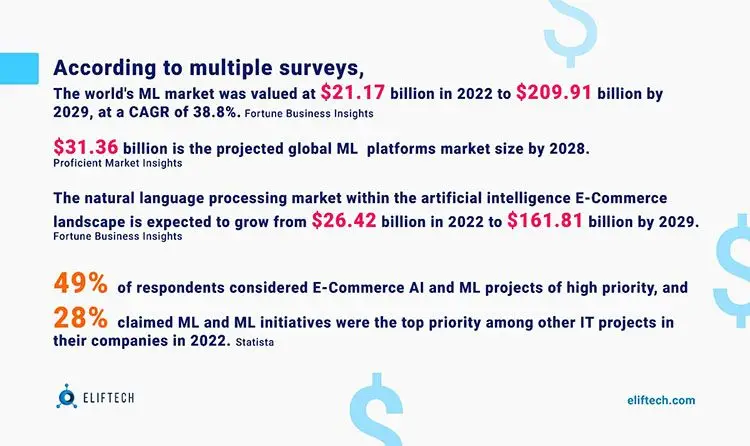
Companies can use information about their customers and consumers to meet the new challenges of the digital consumer era. This refers to the following:
- Growing customer expectations;
- Achieving greater flexibility - both internally and in relationships with customers throughout the value chain;
- Building your digital influence that bypasses traditional distribution models in favor of direct E-Commerce strategies;
- Growing consumer demand for personalized products and a simple, consumer-centric experience.
Companies that manage all the artificial intelligence ecommerce capabilities can build long-term relationships with their consumers and, as a result, establish themselves among industry leaders.
8 Use Cases of Machine Learning in E-commerce
Machine learning has many applications in e-commerce. It can improve the search experience by recommending relevant products, recognizing consumers’ preferences, and offering them content they want to see.
Here are some of the most popular use cases of machine learning in e commerce.
Better Inventory Management
A typical e-commerce website contains thousands of products in dozens of different categories. The main goal of implementing machine learning in e commerce is to simplify the buying process for customers. Customer categories, such as location, age, gender, shopping habits, and previous product views will automatically systematize product search algorithms.
Thanks to ML, there has been significant progress in supply chain management over the past ten years. For example, ML tech is helping e-commerce companies optimize business operations in ways that once seemed like science fiction, from planning store shelves for the next month to managing the inventory of items on a website.
Personalized Product Recommendations
Machine Learning allows for collecting information about user interaction with the system and having a good enough model in advance that gives good recommendations within the subject area without having prior knowledge about specific users on the platform.
Also, the ML-powered software “considers” additional attributes, such as the season, user interaction with other objects, user adjacency, or other information significant for the marketplace.
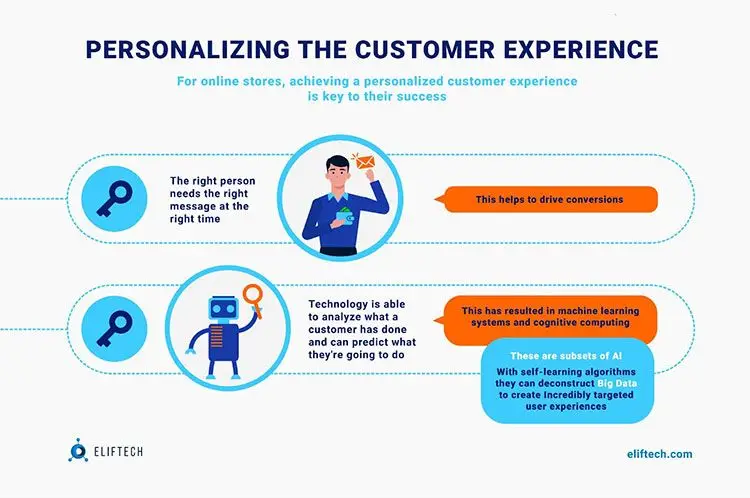
Chatbots & Virtual Assistants
Chatbots and other virtual assistants help companies to benefit from ML and artificial intelligence in ecommerce and retail by offering their online shoppers 24/7 support. With machine learning and AI for ecommerce technologies, chatbots are becoming more intuitive and customer-friendly.
Read more about the ElifTech case: Shopify website design and management system for blanket store
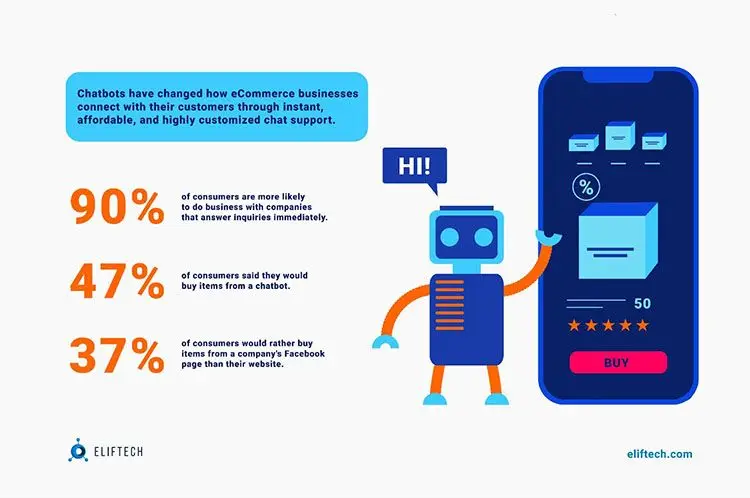
Dynamic Pricing
How can one explain that there is only one price on the website, and when we add a product to the cart but do not check it out, the price goes down after a few days? This is the job of machine learning. Algorithms keep track of all products and constantly change prices, determining the best price for both the seller and the consumer.
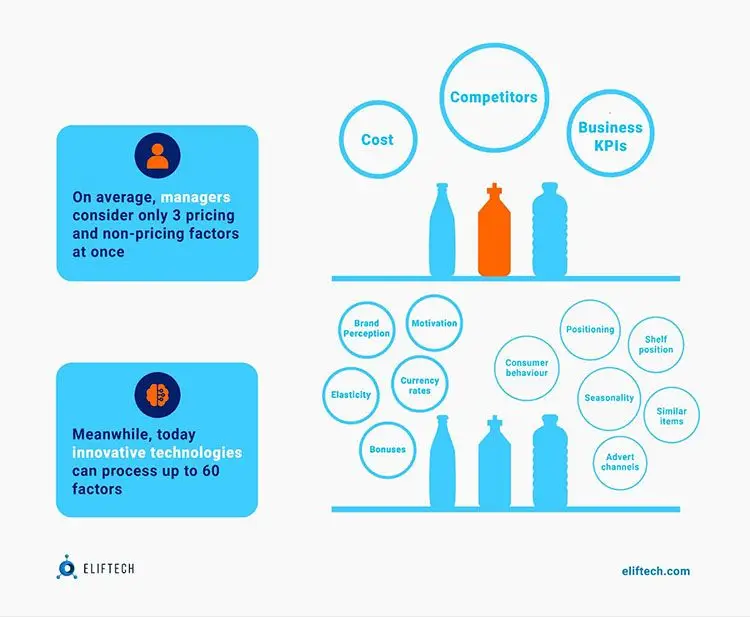
Churn Prediction Models
Churn predictions allow us to react in time and keep clients who are about to leave. Machine learning generates churn prediction models so we can use them to generate more efficient offers to clients. Companies that actively use predictive analytics to prevent churn include Hewlett-Packard, IBM, and Best Buy.
It’s worth mentioning that unpredictable circumstances–such as the 2020 pandemic–may change the market situation and not be included in the training sample. It reduces certain accuracy and increases the gap between the model representations and the real situation.
Augmented Reality Tools
VR technology aims to create a seamless digital environment with the effect of complete immersion. Meanwhile, Augmented Reality (AR) is great for visualization and storytelling as an opportunity to bring something that does not physically exist into our real space.
The ability to add digital content to your physical world has the potential to revolutionize how we shop. The power of mobile devices and browsers has contributed to the growing popularity of augmented reality technology for e-commerce. The immersive experience of AR promises to engage customers, drive sales and enhance brand loyalty.
Image Recognition Technology
Every year it becomes more challenging to find what you need in the wide waters of the World Wide Web. There are a lot of offers, but every one of us wants to spend as little time as possible looking through all the links and tabs. Instead, ML technologies recognize the picture and offer the buyer matching or similar options.
This is the case with Amazon, where you can choose from a variety of products, and then the system will offer you more options that are similar to what you’ve selected. It’s about saving time for each user and making decisions easier and more accurate.
This functionality also helps the seller speed up and facilitate the ad publishing process. After you take a picture, computer vision technology recognizes the product and puts it in the correct category to find it faster. It's already working on Pinterest, eBay, Amazon, Facebook, and Google.
Site Search Autocomplete
Google autocomplete changed shopping forever, suggesting the most popular queries to users by upgrading this “wheel” with AI. Machine learning algorithms leverage various clusters of data:
- Product search algorithms,
- Search history,
- Location,
- Semantic analysis,
- New trends, and more.
Later the same algorithms predict precisely what you want to find. E commerce AI uses a similar mechanism to offer the most suitable products from the product range.
For example, Twiggle uses ML with natural language processing to narrow, contextualize, and improve online shoppers' search results. Another company trying e-commerce AI to improve e commerce product search algorithms is the American technology company Clarifai.
Clarifai's early work was focused on e commerce product search algorithm visualization. The company empowers developers to create smarter apps with advanced image and video recognition to deliver customer-centric experiences. Using machine learning, the ML software automatically labels, arranges, and visually searches for content by labeling the characteristics of images or videos.
How to Adopt a Custom Machine Learning Solution in Your E-Commerce Business
AI & Machine Learning can help you in many ways—from providing better customer service to preventing fraud and ensuring product authenticity. If you want to stay ahead of your competitors, then it’s time to adopt this solution.
Here are a few steps you need to consider when you are planning to adopt a custom AI & Machine Learning solution in e-commerce:
-First, you need to know what your business is trying to achieve. Is it a better user experience? A more targeted ad? A better-targeted product recommendation engine? An automated customer service chatbot?
-Second, evaluate how much time and money you will spend making that happen. The more you invest in AI & machine learning development and testing, the faster you can get results.
-Third, talk with vendors about their approach to implementing these solutions. You want someone who understands your unique challenges and goals and has a plan for achieving them.
Empower your e-commerce business with Eliftech. We provide data-driven and results-oriented solutions to help you strengthen your business. Let us know about your next project.
Wrapping Up
Businesses that take a risk and innovate will have the opportunity to grow their businesses, reduce costs, and increase revenue. Businesses should consider innovation at all stages of development—from product design and manufacturing to distribution. This means looking at ways to improve existing systems as well as exploring new technologies that could be used in the future.
FAQ
Browse our case studies and get actionable insights to drive your success
See more